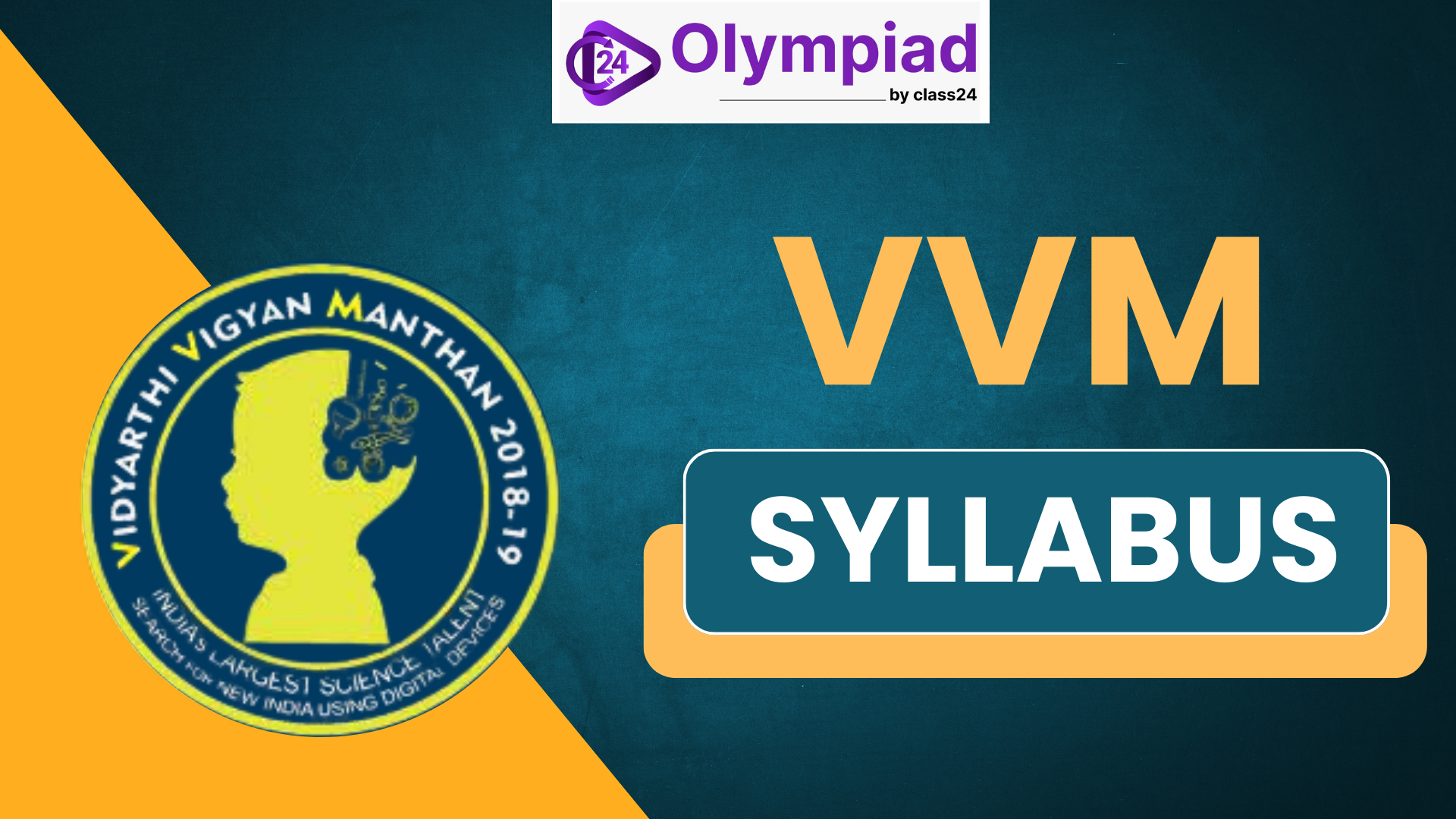
Vidyarthi Vigyan Manthan (VVM) is a talent search exam in sciences conducted by Vigyan Prasar (VP), NCERT, and VIBHA. Students of classes 6 to 11 participate in it once a year on an online basis on the VVM mobile application. This exam not only tests the academic knowledge of the student, but it also tests the logical reasoning and awareness of scientific contributions made by India in the science field, as well as the life and works of great scientists. This ensures VVM to be one of the most distinct science competitions in India.
This blog will give a detailed class-wise VVM syllabus, exam pattern, important topics, and tips to prepare for VVM 2025. This guide will help you ensure you understand the exam better and make sufficient prep plans, whether you are a student, parent, or teacher.
The VVM syllabus 2025 will ask students questions based on what they may know, their reasoning, and India-related scientists. It is broken down into four major components, which are assigned various weightages in the exam
| Section | Weightage | Key Focus Areas |
|---|---|---|
| Science & Mathematics | 50% | NCERT-based Physics Chemistry Biology Maths (Class-wise) |
| Indian Contribution to Science | 20% | Ancient & modern Indian scientists Innovations Heritage |
| Life Story of a Scientist | 20% | Biography Works Achievements of one eminent scientist (announced yearly) |
| Logic & Reasoning | 10% | Analytical ability Puzzles Series Coding-decoding Problem-solving |
The Science & Maths section is not based on any other material than NCERT, and this fraction varies according to the common classes (6 to 11).
The Indian Contribution unit showcases the contribution made by India in terms of traditional know-how and present-day science.
The Life Story of a Scientist is renewed year by year; in 2025, a new scientist will be introduced officially.
Logic & Reasoning is based on mental capacity and quick problem-solving.
Depending on the class (classes 6 to 11), the VVM syllabus 2025 is different, but the core sections are the same. See below the syllabus:
1. Science & Mathematics (50%)
The section examines the NCERT-based knowledge in Physics, Chemistry, Biology, and Mathematics.
For classes 6-8
| Subject | Topics Covered |
|---|---|
| Physics | Motion Light Force Work & Energy Sound Electricity basics |
| Chemistry | Matter Atoms & Molecules Elements & Compounds Simple Reactions |
| Biology | Cells Tissues Plant & Animal Physiology Ecosystem Nutrition |
| Mathematics | Arithmetic Geometry Algebra (basics) Data Handling Simple Equations |
For classes 9-10
| Subject | Topics Covered |
|---|---|
| Chemistry | Atomic Structure Chemical Bonding Acids & Bases Carbon Compounds Periodic Table |
| Biology | Life Processes Reproduction Genetics & Evolution Human Physiology Environment |
| Mathematics | Algebra Geometry Trigonometry Statistics Probability |
For classes 11
| Subject | Topics Covered |
|---|---|
| Physics | Kinematics Laws of Motion Work, Energy & Power Gravitation Thermodynamics Oscillations Waves |
| Chemistry | Some Basic Concepts Structure of an Atom Classification of Elements Chemical Bonding Thermodynamics Equilibrium |
| Biology | Diversity of the Living World Plant Physiology Human Physiology Biomolecules Cell Biology |
| Mathematics | Sets, Relations & Functions Trigonometric Functions Permutations & Combinations Binomial Theorem Calculus (basics) |
2. Indian Contribution to Science (20%)
This segment focuses on the science of Indian heritage & contributions.
3. Life Story of a Scientist (20%)
Each year, VVM picks one outstanding scientist whose life and work are incorporated into the syllabus.
4. Logic & Reasoning (10%)
This section checks analytical and problem-solving skills.
Topics include:
The path to preparation of the Vidyarthi Vigyan Manthan (VVM) takes clever planning, discipline, and appropriate study material. Given the VVM 2025 syllabus pattern where NCERT topics, reasoning, and Indian scientific heritage all feature, students ought to pay attention to conceptual understanding as well as practice. The following are some preparation tips on how to do it effectively:
1. Know the Syllabus Thoroughly
2. Focus on NCERT Books First
3. Use VVM Study Material
4. Make Short Notes
5. Attempt Mock Tests
6. Stay Consistent with Revision
Vidyarthi Vigyan Manthan (VVM) is not only an examination, but a special learning process for students. Being involved in VVM 2025, students become familiar with science beyond the texts of textbooks and receive skills that can be later used in their professional and academic life. Some of the main advantages are as follows:
1. Recognition and Certificates
2. Medals, Awards, and Scholarships
3. Opportunity to Attend Science Camps
4. Interaction with Scientists
5. Nationwide Exposure
The VVM Syllabus 2025 is well considered to give students a healthy blend of academic knowledge, logical thinking, and knowledge of scientific heritage in India. Coverage of NCERT patterned Science and Maths, the role of Indian scientists, and a life history of a selected scientist, the exam delves beyond conventional education and encourages a thinking mind by applying mental faculties.
The VVM 2025 syllabus can be completed diligently by adhering to NCERT books, VVM study material and mock tests, and frequent revision, and students can comfortably ace the examination. Participation in VVM 2025 not only assists them in developing their expertise in the subject but also gives them a nationwide exposure to scientific recognition, an exposure to scientists across the country, and a more realistic picture of India as a scientific country.
In brief, in preparing to take the VVM exam 2025, it is important not only to learn how to obtain marks, but also how to be curious and how to think scientifically and how to think like a researcher, and how to establish a way to enter the research world in the future later in life. Through hard work and the proper course of action, every student can excel in this esteemed exam.
Download free study resources for Vidyarthi Vigyan Manthan (VVM) 2025 – Section A. Access subject-wise PDFs to strengthen your preparation.
Boost your exam preparation with our curated free resources for the Vidyarthi Vigyan Manthan (VVM) 2025 – Senior Group. Access subject-wise module samples and practice tests to strengthen your concepts and excel in the competition.
Download subject-wise free resources for the Vidyarthi Vigyan Manthan (VVM) 2025 – Junior Group. Access module samples and a practice test to improve your preparation.




Leave a Comment